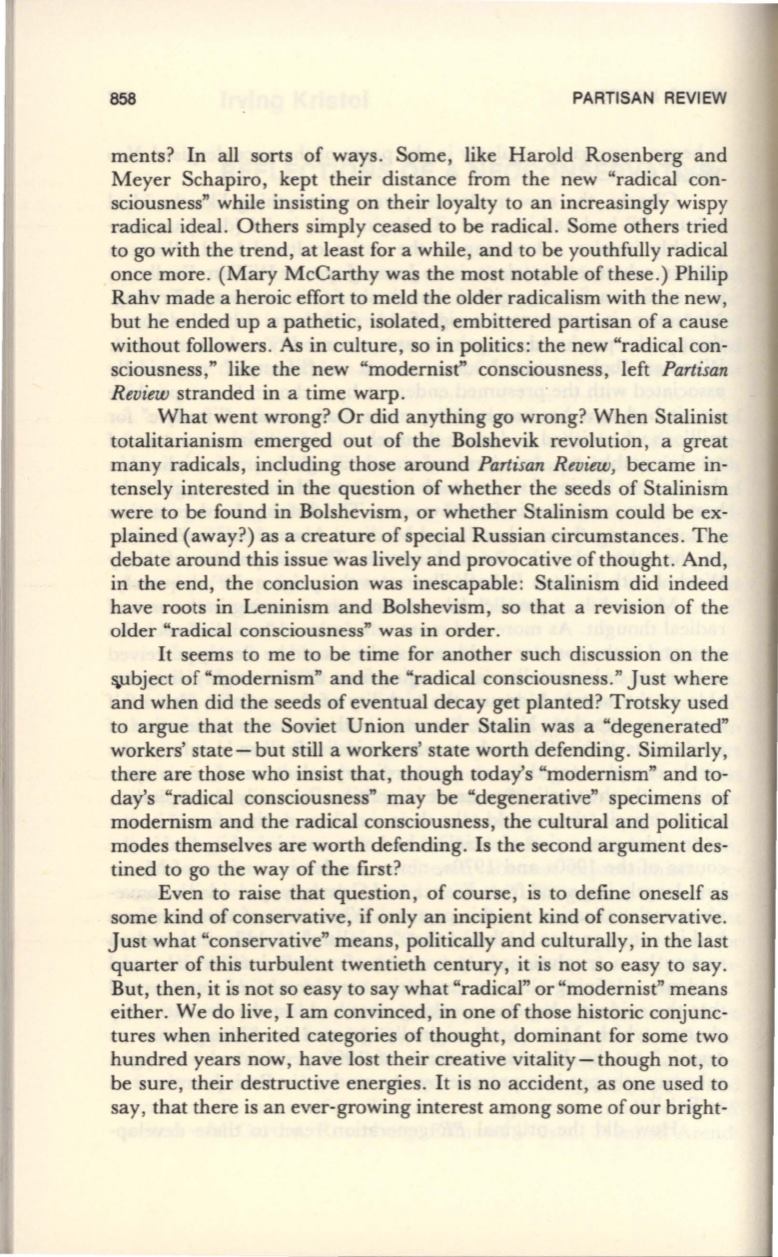
858
PARTISAN REVIEW
ments? In all sorts of ways. Some, like Harold Rosenberg and
Meyer Schapiro, kept their distance from the new "radical con–
sciousness" while insisting on their loyalty to an increasingly wispy
radical ideal. Others simply ceased to be radical. Some others tried
to go with the trend, at least for a while, and to be youthfully radical
once more. (Mary McCarthy was the most notable of these.) Philip
Rahv made a heroic effort to meld the older radicalism with the new,
but he ended up a pathetic, isolated, embittered partisan of a cause
without followers. As in culture, so in politics: the new "radical con–
sciousness," like the new "modernist" consciousness, left
Partisan
Review
stranded in a time warp.
What went wrong? Or did anything go wrong? When Stalinist
totalitarianism emerged out of the Bolshevik revolution, a great
many radicals, including those around
Partisan Review,
became in–
tensely interested in the question of whether the seeds of Stalinism
were to be found in Bolshevism, or whether Stalinism could be ex–
plained (away?) as a creature of special Russian circumstances. The
debate around this issue was lively and provocative of thought. And,
in the end, the conclusion was inescapable: Stalinism did indeed
have roots in Leninism and Bolshevism, so that a revision of the
older "radical consciousness" was in order.
It seems to me to be time for another such discussion on the
~ubject
of "modernism" and the "radical consciousness." Just where
and when did the seeds of eventual decay get planted? Trotsky used
to argue that the Soviet Union under Stalin was a "degenerated"
workers' state-but still a workers' state worth defending. Similarly,
there are those who insist that, though today's "modernism" and to–
day's "radical consciousness" may be "degenerative" specimens of
modernism and the radical consciousness, the cultural and political
modes themselves are worth defending. Is the second argument des–
tined to go the way of the first?
Even to raise that question, of course, is to define oneself as
some kind of conservative, if only an incipient kind of conservative.
Just what "conservative" means, politically and culturally, in the last
quarter of this turbulent twentieth century, it is not so easy to say.
But, then, it is not so easy to say what "radical" or "modernist" means
either. We do live, I am convinced, in one of those historic conjunc–
tures when inherited categories of thought, dominant for some two
hundred years now, have lost their creative vitality-though not, to
be sure, their destructive energies. It is no accident, as one used to
say, that there is an ever-growing interest among some of our bright-


